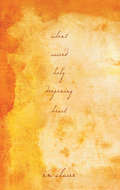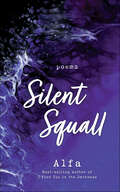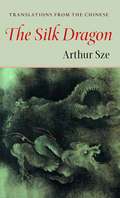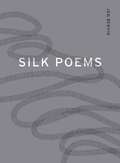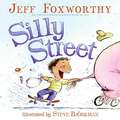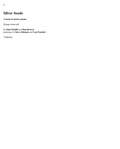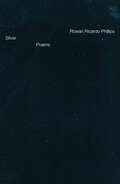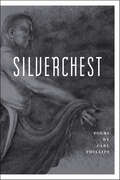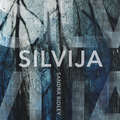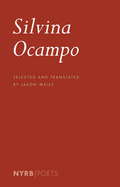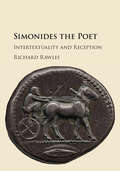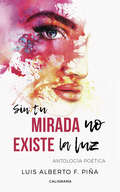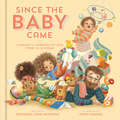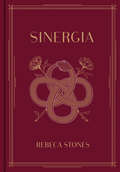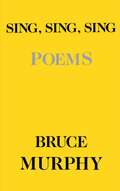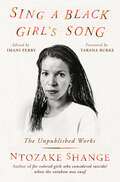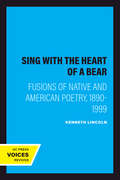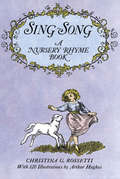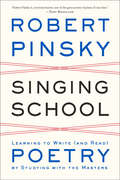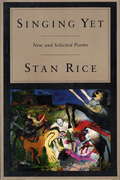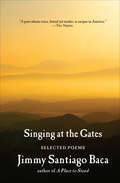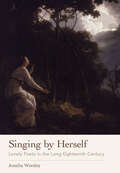- Table View
- List View
Silent Sacred Holy Deepening Heart
by Em ClaireThis collection is from the pen of Neale Donald Walsch’s wife, Em Claire. These warmly engaging poems are divided into three sections Remembering, Naked, and Forgetting.The purpose of the poetry of Em Claire is written with the intention of celebrating the Oneness of all Creation and exploring the mystery of who we are. Claire envisions her work as "a lantern in the window to which you have just this moment lead yourself, for reasons your own Self and Soul know."This is a book for those who loved the work of Hugh Prather and Rod McKuen; for those interested in using the power of language for healing and power growth. And, of course, this is a book for the many fans of Neale Donald Walsch.
Silent Squall: Poems
by AlfaA poetic portrayal of the unseen tempests of emotional and physical abuse from the bestselling author of Abandoned Breaths and I Needed a Viking.Raw and honest, the acclaimed author of I Find You in the Darkness shares her intensely personal, yet relatable stories through finely woven poetry. This new edition of Silent Squall includes an updated introduction and a brand-new chapter of modern poetry. Find understanding, comfort, and hope from the affecting poetry of Silent Squall.I have singed wings,and the edges of my heartare charred, and crispby flames of your dismissal.Yet even though I siftthrough ashes of the past,as I maneuver throughtomorrow . . . my soul’s fingerprintwill be everlasting.—Alfa
Silk Dragon
by Arthur SzeArthur Sze has rare qualifications when it comes to translating Chinese: he is an award-winning poet who was raised in both languages. A second-generation Chinese-American, Sze has gathered over 70 poems by poets who have had a profound effect on Chinese culture, American poetics and Sze's own maturation as an artist. Also included is an informative insightful essay on the methods and processes involved in translating ideogrammic poetry.MOONLIGHT NIGHTby Tu Fu can only look out alone at the moon. From Ch'ang-an I pity my children who cannot yet remember or understand.Her hair is damp in the fragrant mist. Her arms are cold in the clear light. When will we lean beside the window and the moon shine on our dried tears?Sze's anthology features poets who have become literary icons to generations of Chinese readers and scholars. Included are the poems of the great, rarely translated female poet Li Ching Chao alongside the remorseful exile poems of Su Tung-p'o. This book will prove a necessary and insightful addition to the library of any reader of poetry in translation.The poets include: T'ao Ch'ien Wang Han Wang Wei Li Po Tu Fu Po Ch -yi Tu Mu Li Shang-yin Su Tung-p'o Li Ch'ing-chao Shen Chou Chu Ta Wen I-to Yen ChenArthur Sze is the author of six previous books of poetry, including The Redshifting Web and Archipelago. He has received the Asian American Literary Award for his poetry and translation, a prestigious Lannan Literary Award, and was recently a finalist for the Leonore Marshall Poetry Prize. He teaches at the Institute of American Indian Arts.from A Painting of a CatNan Ch'uan wanted to be reborn as a water buffalo, but who did the body of the malicious cat become? Black clouds and covering snow are alike. It took thirty years for clouds to disperse, snow to melt.-Pa-ta-shan-jen (1626-1705)The Last DayWater sobs and sobs in the bamboo pipe gutter. Green tongues of banana leaves lick at the windowpanes. The four sur
Silk Poems
by Jen BervinIn conjunction with Tufts University’s Silk Lab’s cutting-edge research on liquified silk, Jen Bervin wrote a poem composed in a six-character chain that corresponds to the DNA structure of silk; modeled on the way a silkworm applies filament to its cocoon. This poem, written from the perspective of the silkworm, explores the cultural, scientific, and linguistic complexities of silk written inside the body.
Silly Sally
by Audrey Wood"Silly Sally went to town, walking backwards, upside down." And that's just the beginning... Come along with silly Sally and her silly companions as they parade into town in a most unusual way.
Silly Street
by Jeff FoxworthyAnything goes on Silly Street. There's a flying squirrel circus, pink elephant races, and even a pony that eats fried baloney. At the candy booth you can buy gummy yum noodles and rainbow jaw busters. At the hat store you can purchase a helmet, a tiara, or a halo-if you happen to be an angel. From the comedic mind of Jeff Foxworthy, author of the bestselling dirt on my shirt, comes another hilarious collection of poems. Kids will have so much fun reading these poems, they'll wish they actually lived on Silly Street.
Silver Seeds
by Steve Johnson Lou Fancher Paul Paolilli Dan BrewerSilver seeds Tossed in the air And planted in the sky, Reaching out of the darkness, Sprouting wonder. The poems in this book, done in a creative acrostic format, show us the world of nature in a different light. Steve Johnson and Lou Fancher's glowing illustrations will give readers a new appreciation for the wonders of nature. Beginning with daybreak and ending with a beautiful interpretation of night, the poems include striking images of the sun, fog, and rain.
Silver: Poems
by Rowan Ricardo PhillipsRowan Ricardo Phillips’s fourth collection is a book as lustrous as the metal of its title. This beautiful, slender collection—small and weighted like a coin—is Rowan Ricardo Phillips at his very best. These luminous, unsparing, dreamlike poems are as lyrical as they are virtuosic. “Not the meaning,” Phillips writes, “but the meaningfulness of this mystery we call life” powers these poems as they conjure their prismatic array of characters, textures, and moods. As it reverberates through several styles (blank verse, elegy, terza rima, rhyme royal, translation, rap), Silver reimagines them with such extraordinary vision and alluring strangeness that they sound irrepressibly fresh and vibrant. From beginning to end, Silver is a collection that reflects Phillips’s guiding principle—“part physics, part faith, part void”—that all is reflected in poetry and poetry is reflected in all.This is work that brings into acute focus the singular and glorious power of poetry in our complex world.
Silverchest: Poems
by Carl Phillips"After / the afterlife, there's an afterlife."In Silverchest, his twelfth book, Carl Phillips considers how our fears and excesses, the damage we cause both to others and to ourselves, intentional and not, can lead not only to a kind of wisdom but also to renewal, maybe even joy, if we're willing to commit fully to a life in which "I love you / means what, exactly?" In poems shot through with his signature mix of eros, restless energy, and moral scrutiny, Phillips argues for the particular courage it takes to look at the self squarely—not with judgment but with understanding—and extend that self more honestly toward others. It's a risk, there's a lot to lose, but if it's true that "we'll drown anyway—why not / in color?"
Silvija
by Sandra RidleyGrief is personal and unpredictable; no two people experience it the same way, and yet, each person that comes out the other side is transformed by their experience of loss and redemption.In a sequence of five feverish elegies, Sandra Ridley's Silvija combines narrative lyric and experimental verse styles to manifest dark themes related to love and loss: the traumas of psychological suffering (isolation and confinement), physical abuse (by parent and partner), terminal illness (brain tumour and heart attack), revelation, resolution, and healing. Pulsing with the award-winning writer's signature blend of fervour and sangfroid, the serial poems in Silvija accrue into a book-length testament to a grief both personal and human, leaving readers with the redemptive grace that comes from poetry's ability to wrestle chaos into meaning.Because of its overarching themes and serial form, Silvija is best read cover-to-cover, analogous to a work of fiction, rather than a book of individual or occasional poems. In this way, and in dealing with timeless subjects of human significance, this book-length 'requiem for loss' bears comparisons to Anne Carson's Nox and Daphne Marlatt's The Given, and will resonate for the many people who have dealt with traumas of physical and mental illness, who have survived physical and/or emotional abuse, and who search for beauty after catastrophe.
Silvina Ocampo
by Silvina Ocampo Jason WeissSilvina Ocampo possessed her own special enchantment as a poet, and only now is her extraordinary poetic achievement becoming more widely recognized beyond Latin America. Remarkably, this is the first collection of Ocampo's poetry to appear in English. From her early sonnets on the native Argentine landscape, to her meditations on love's travails, to her explorations of the kinship between plant and animal realms, to her clairvoyant inquiries into history and myth and memory, readers will find the full range of Ocampo's "metaphysical lyricism" (The Independent) represented in this groundbreaking edition.he metaphysical turn in her later verse.
Simonides the Poet: Intertextuality and Reception
by Richard RawlesSimonides is tantalising and enigmatic, known both from fragments and from an extensive tradition of anecdotes. This monograph, the first in English for a generation, employs a two-part diachronic approach: Richard Rawles first reads Simonidean fragments with attention to their intertextual relationship with earlier works and traditions, and then explores Simonides through his ancient reception. In the first part, interactions between Simonides’ own poems and earlier traditions, both epic and lyric, are studied in his melic fragments and then in his elegies. The second part focuses on an important strand in Simonides’ ancient reception, concerning his supposed meanness and interest in remuneration. This is examined in Pindar’s Isthmian 2, and then in Simonides’ reception up to the Hellenistic period. The book concludes with a full reinterpretation of Theocritus 16, a poem which engages both with Simonides’ poems and with traditions about his life.
Sin tu mirada no existe la luz: Antología poética
by Luis Alberto F. PiñaLa reafirmación de los sentimientos a través de la poesía. <P><P>En unos tiempos donde los verdaderos sentimientos son cada vez más reservados, diluyéndolos en distracciones momentáneas y superficiales, irrumpe Sin tu mirada no existe la luz para reafirmar que todo tiene energía, un alma que conserva la semilla donde nacerán las emociones. <P><P>Luis Alberto F. Piña regresa a la literatura con su primer poemario para exponer el mundo a través de sus ojos: el desamor que nos persigue durante toda la vida; la sombra de la hiriente soledad, siempre acechante; las casualidades que el destino interpone ante nosotros; ese amor platónico que nunca será alcanzado, por mucho que se intente; la crítica hacia las injusticias que se siguen manteniendo en la sociedad... Sin tu mirada no existe la luz es un libro de poemas que interroga a la razón y al corazón.
Since the Baby Came: A Sibling's Learning-to-Love Story in 16 Poems
by Kathleen Long BostromThis charming, playful story-in-verse introduces children to a variety of different poetic forms while walking them through all the twists and turns of welcoming a new baby into the family.Mama is having a baby.Everything&’s starting to change.God, can you tell me what happened?Life is becoming so strange.Since the Baby Came offers a unique take on a timeless topic. The heartfelt and humorous drama unfolds completely in verse, addressing the full range of emotions a young child experiences when a new baby joins the family—from surprise and confusion to feelings of neglect and jealousy to wholehearted tenderness and affection. The book also introduces young children to the playfulness and fun of various forms of poetry, from senryu to villanelle. Look out! It&’s a diaper volcano!Forgive me for being abrupt.There isn&’t much time to explain—OH!That thing is about to erupt!
Sinergia
by Rebeca StonesEl libro más íntimo de Rebeca Stones. «Te animo a abrirte paso entre mis latidos.Te animo a descubrir el desamor, el dolor y la rabia, la recuperacióny la verdadera sinergia.Aquí, entre tus manos, poso parte de mi historia.» Rebeca ha pasado un año muy difícil, pero en vez de dejarse aplastar por el peso de sus pensamientos, los ha usado como inspiración para escribir una historia de desamor y amor contada tan solo con sentimientos.
Sing
by Tom Lichtenheld Joe RaposoThis book is based on Joe Raposo’s song, “Sing” from “Sesame Street”. It is the story of 3 baby birds who just begin to sing. Musical notes float into the air and the first two birds take off in flight as they utter song. The third bird sits silent and discouraged. It sits alone until a boy with a guitar sits beneath the bird in the nest. His musical notes from his songs float up and around this little bird until the bird can utter the notes that give it flight.
Sing Sing Sing: Poems
by Bruce MurphySing, Sing, Sing is unlike any recent first collection by an American poet. It goes against the grain of contemporary fashion by replacing prosaic narrative with a lyricism both symbolic and mysterious. This poet can appreciate experience as "the open/End of a bag fill/With ordinary things," yet also he has an ear for "a watch that goes on ticking/Underground," the shadow of history that lies across the present. Murphy manifests a sense of responsibility for protecting the spirit of lost people and lost things. But in their concern for posterity, his poems use language to forge a memory of the future. This ethical impulse, "the voice of the conscious heart," gives rise to a poetry which is, even when most admonitory, compassionate. Murphy explores our involvement in history as its doers, sufferers, and writers. Hence his poetry is at the intersection of the personal and that sense of our anonymity together in which "anyone can write my story," The title, Sing, Sing, Sing, hints at the imperative music that characterizes these poems.
Sing a Black Girl's Song: The Unpublished Work of Ntozake Shange
by Ntozake ShangeGMA&’s 15 Spectacular New Books to Read in September Ms. Magazine&’s September 2023 Reads for the Rest of UsThe Millions &“Most Anticipated&” Books of 2023LitHub&’s Most Anticipated Books of 2023Never-before-seen unpublished works by award-winning American literary icon Ntozake Shange, featuring essays, plays, and poems from the archives of the seminal Black feminist writer who stands alongside giants like Toni Morrison and Alice Walker, curated by National Book Award winner Imani Perry with a foreword by New York Times bestselling author Tarana Burke. In the late &’60s, Ntozake Shange was a student at Barnard College discovering her budding talent as a writer, publishing in her school&’s literary journal, and finding her unique voice. By the time she left us in 2018, Shange had scorched blazing trails across countless pages and stages, redefining genre and form as we know them, each verse, dance, and song a love letter to Black women and girls, and the community at large. Sing a Black Girl&’s Song is a new posthumous collection of Shange&’s unpublished poems, essays, and plays from throughout the life of the seminal Black feminist writer. In these pages we meet young Shange, learn the moments that inspired for colored girls who have considered suicide/when the rainbow is enuf…, travel with an eclectic family of musicians, sit on &“The Couch&” opposite Shange&’s therapist, and discover plays written after for colored girls&’ international success. Sing a Black Girl&’s Song houses, in their original form, the literary rebel&’s politically charged verses from the Black Arts Movement era alongside her signature tender rhythm and cadence that capture the minutia and nuance of Black life. Sing a Black Girl&’s Song is the continuation of a literary tradition that has bolstered generations of writers and a long-lasting gift from one of the fiercest and most highly celebrated artists of our time.
Sing a Song of Popcorn
by Eva Moore Beatrice Schenk de Regniers Jan Carr Mary Michaels WhiteA collection of 115 poems by a variety of well-known authors with illustrations by nine Caldecott medalists.
Sing with the Heart of a Bear: Fusions of Native and American Poetry, 1890-1999
by Kenneth LincolnExamining contemporary poetry by way of ethnicity and gender, Kenneth Lincoln tracks the Renaissance invention of the Wild Man and the recurrent Adamic myth of the lost Garden. He discusses the first anthology of American Indian verse, The Path on the Rainbow (1918), which opened Jorge Luis Borges' university surveys of American literature, to thirty-five contemporary Indian poets who speak to, with, and against American mainstream bards. From Whitman's free verse, through the Greenwich Village Renaissance (sandwiched between the world wars) and the post-apocalyptic Beat incantations, to transglobal questions of tribe and verse at the century's close, Lincoln shows where we mine the mother lode of New World voices, what distinguishes American verse, which tales our poets sing and what inflections we hear in the rhythms, pitches, and parsings of native lines.Lincoln presents the Lakota concept of "singing with the heart of a bear" as poetry which moves through an artist. He argues for a fusion of estranged cultures, tribal and émigré, margin and mainstream, in detailing the ethnopoetics of Native American translation and the growing modernist concern for a "native" sense of the "makings" of American verse. This fascinating work represents a major new effort in understanding American and Native American literature, spirituality, and culture.
Sing-Song: A Nursery Rhyme Book (Dover Children's Classics)
by Christina G. RossettiGood poetry for children is rare. Few collections, few single poems in fact, survive beyond a few years of popularity. There are exceptions — the poetry and verse of Walter de la Mare, Lewis Carroll, and Edward Lear come to mind. Still rarer is successful children's poetry by a poet known equally for other work, such as Christina Rossetti. <p><p> These verses — deceptively simple, light, often like a nursery rhyme in character — consider such topics as childhood activities, children's cruelty and gentleness, roses and wild flowers, nesting birds and farm animals, cold winter and blossoming spring. Many pose riddles and conundrums ("A hill has no leg, but has a foot;/A wine-glass a stem, but not a root"). <p> This is the only edition in print to reproduce the poems with the illustrations which originally accompanied them. Engravings by Arthur Hughes, one of the best-known illustrators of the Victorian era, catch the mood of each verse. <p> Sing-Song is a fitting name for this collection: many of the verses capture the cadence of the ballad. Children will enjoy their music. Parents will find the simple content and lyrical language of the verses ideal for reading aloud.
Singing School: Learning to Write (and Read) Poetry by Studying with the Masters
by Robert Pinsky"Magnificent . . . poems to inspire [with] brief and brilliant, offhand notes about how to read them."--Alan Cheuse, NPR Quick, joyful, and playfully astringent, with surprising comparisons and examples, this collection takes an unconventional approach to the art of poetry. Instead of rules, theories, or recipes, Singing School emphasizes ways to learn from great work: studying magnificent, monumentally enduring poems and how they are made-- in terms borrowed from the "singing school" of William Butler Yeats's "Sailing to Byzantium." Robert Pinsky's headnotes for each of the 80 poems and his brief introductions to each section take a writer's view of specific works: William Carlos Williams's "Fine Work with Pitch and Copper" for intense verbal music; Emily Dickinson's "Because I Could Not Stop for Death" for wild imagination in matter-of-fact language; Robert Southwell's "The Burning Babe" for surrealist aplomb; Wallace Stevens's "The House Was Quiet and the World Was Calm" for subtlety in meter. Included are poems by Aphra Behn, Allen Ginsberg, George Herbert, John Keats, Mina Loy, Thomas Nashe, and many other master poets. This anthology respects poetry's mysteries in two senses of the word: techniques of craft and strokes of the inexplicable.
Singing Yet
by Stan Rice"There are so many profound and finely constructed poems in Singing Yet (like the Whitmanesque 'America the Beautiful' in which the poet pledges allegiance 'this time to the vivification of our lost Body Politic,/ nerves and follicles and arteries/ ablaze in the suaveness of night') that it is impossible to cover even a fourth of this collection... As a volume of selected poems... it stands a monument to the trust of the poet's own life and writings." Dave Oliphant, Texas Observer "The new and selected poems in Stan Rice's Singing Yet forcefully resist categorization. They are not shaped or mannered to fit in anybody's idea of a school of poetry, and yet they are equally uninterested in being ingratiating to the reader who is ignorant of contemporary poetry... the new work contains Rice's most completely realized poems, small masterpieces like 'I Called the Cow' and 'The Madness of Chance,' chancey but absorbing autobiographical rambles like 'Time in Tool,' and a dozen black comic riffs." Ralph Adamo, New Orleans Times-Picayune "Although Rice's first book in nine years includes work from three earlier volumes, it also stands as a whole... he affirms the physicality of language and flesh, the 'doctrine of perception as animal things defined.' And through affirmation, he acquires compassion and tenderness. This is serious stuff, urgent and original." Publisher's Weekly
Singing at the Gates: Selected Poems (Books That Changed the World)
by Jimmy Santiago Baca“This fiery retrospective collection” of poetry by the acclaimed Chicano-American author of A Place to Stand is “warm and furious…righteous and prayerful” (Booklist).Award-winning writer Jimmy Santiago Baca is lauded for his talent in weaving personal and political threads to create a pertinent and poignant narrative. He addresses universal issues with passion, grace, and vivid sensory detail.Singing at the Gates is a collection of Baca’s work stretching across four decades—poems that revitalize the national dialogue: raging against war and imprisonment, celebrating family and the bonds of friendship, heightening appreciation for and consciousness of the environment. A career-spanning selection, it includes poems drawn from Baca’s first chapbook, letters he wrote from prison to a woman named Mariposa, and recent meditations on the significance of breaking through oppression. “A poet whose voice, brutal and tender, is unique in America.”—The Nation
Singing by Herself: Lonely Poets in the Long Eighteenth Century
by Amelia WorsleySinging by Herself reinterprets the rise of literary loneliness by foregrounding the female and feminized figures who have been overlooked in previous histories of solitude. Many of the earliest records of the terms "lonely" and "loneliness" in British literature describe solitaries whose songs positioned them within the tradition of female complaint. Amelia Worsley shows how these feminized solitaries, for whom loneliness was both a space of danger and a space of productive retreat, helped to make loneliness attractive to future lonely poets, despite the sense of suspicion it evoked. Although loneliness today is often associated with states of atomized interiority, soliloquy, and self-enclosure, this study of eighteenth-century poetry disrupts the presumed association between isolation, singular speech, and bounded models of poetic subjectivity. In five chapters focused on lonely poet figures in the works of John Milton, Anne Finch, Alexander Pope, Thomas Gray, and Charlotte Smith—which also take account of the wider eighteenth-century fascination with literary loneliness—Singing by Herself shows how poets increasingly associated the new literary mode of being alone with states of disembodiment, dispersal, and echoic self-doubling. Seemingly solitary lonely voices often dissolve into polyvocal, allusive community, Worsley argues, when in dialogue with each other and also with classical figures of feminized lament such as Sappho, Echo, and Philomela.The book's provocative reflections on lyric mean that it will have a broad appeal to scholars interested in the history of poetry and poetics, as well as to those who study the literary history of gender, affect, and emotion.
